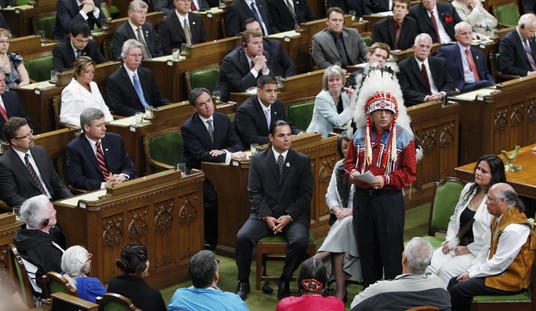Monday’s meeting between President Barack Obama and Prime Minister Binyamin Netanyahu does not appear to have been the “clash” that some feared. There was, however, little in it to reassure Israelis realistically attuned to the prevailing situations and dangers in our region.
On the Palestinian issue, Obama told the press after the meeting that “the prime minister … has an historic opportunity to get a serious movement on this issue during his tenure.” On the ground, Hamas — a radical movement openly pledged to Israel’s annihilation and no less extreme than direct U.S. foes like al-Qaeda and the Taliban — rules Gaza. In the West Bank under purportedly more “moderate” rule, Palestinian children are raised on a steady diet of negation of Israel and glorification of anti-Israeli terrorists. President Mahmoud Abbas denies Israel’s right to exist as a Jewish state and has never budged on the “right of return” for 1948 refugees and their descendants — recognized across the Israeli spectrum as code for Israel’s demographic destruction.
Ignoring these realities is no less delusional than, say, ignoring the Taliban while discussing Pakistan’s chances to achieve stability. Yet throughout the press conference after the two leaders’ tête-à-tête there was virtually no mention of them. Hamas was mentioned only by Obama in response to reporters’ questions — and only to attribute its rise to an alleged lack of diplomatic activity. In fact, Hamas’s growth coincides exactly with the post-1992 period of intensive U.S.-Israeli-Palestinian diplomatic engagement, right up through Annapolis and the fervent embrace by George W. Bush, Ehud Olmert, and Tzipi Livni of Palestinian statehood as a goal coupled with Olmert’s actual, direct offer of statehood to Abbas.
None of this, however, deterred Obama from calling for “a two-state solution in which Israelis and Palestinians are living side by side in peace and security” — despite Obama’s full knowledge that Netanyahu, the elected leader of a sovereign democracy, has a serious reservation about the word “state” in this context. The Gaza precedent, where Palestinian empowerment resulted in relentless rocket attacks on Israeli targets, has only further underlined the grave danger that Palestinian militarization west of the Jordan would pose to Israel’s airport, capital city Jerusalem, heavily populated coastal plain, vital infrastructure and arteries, and military bases. Netanyahu, for his part, said Israel “want[s] [the Palestinians] to govern themselves, absent a handful of powers that could endanger the state of Israel.” His avoidance of the word “state” and the reasons for it meet continued contempt in Washington, however decorously and indirectly Obama expresses that contempt.
The disconnect between reality and Obama’s attitudes is only reinforced by the president’s mention of “a wide-ranging, regional peace” — which, judging by his recent meeting with Jordan’s King Abdullah, upcoming meetings with Abbas and Egyptian President Hosni Mubarak, and a planned address to the Muslim world from Cairo on June 4, is for him a matter of serious intent and not just of rhetoric. How all this is supposed to be squared with the current situations in Gaza and the West Bank, including both those entities’ bedrock antagonism toward Israel, is not explained. But the prospect for Israel of major diplomatic pressure that ignores its security challenges is very real.
On the Iranian issue, it’s no secret that Israel is not enthused about the U.S. administration’s relatively relaxed timeline on Iran’s march toward the bomb — or, as Obama put it on Monday, “what we’re going to do is try something new, which is actually engaging and reaching out to the Iranians.” Clearly this approach is not new at all and, during the Bush administration, was tried by the Europeans — sometimes with direct Bush-administration involvement — with zero results.
Indeed, Obama’s earlier statements to Newsweek were more amenable to Israeli perceptions than what he had to say, at least in the public part, on Monday. To Newsweek Obama said:
“I’ve been very clear that I don’t take any options off the table with respect to Iran. I don’t take options off the table when it comes to U.S. security, period.” And: “I understand very clearly that Israel considers Iran an existential threat. … They’re right there in range and I don’t think it’s my place to determine for the Israelis what their security needs are.”
Comparatively, Obama’s words on Monday had a “Don’t get your hopes up” ring. He said he had “assured the prime minister that we are not foreclosing a range of steps, including much stronger international sanctions, in assuring that Iran understands that we are serious”; and that “we should have a fairly good sense by the end of the year as to whether they are moving in the right direction.” The references to sanctions as a sort of extreme option — sanctions having been, again, attempted doggedly during the Bush years without no effect on Iran’s nuclear program — and to the “end of the year” are not music to the Israeli sense of the acuteness of the situation. Or as Israel’s head of military intelligence put it last week:
Iran is intentionally advancing its nuclear development in such a way as not to cross any nuclear red lines, by enriching low-grade uranium that is not sufficient for weapons development, but that can quickly be adapted to weapons-grade uranium in such a short period of time that the process can’t be sabotaged.
In other words, Iran is as always exploiting Western prevarication and Israelis cannot be confident that Obama is addressing — despite his acknowledgment that “Iran obtaining a nuclear weapon would not only be a threat to Israel and a threat to the United States, but would be profoundly destabilizing in the international community as a whole” — the full gravity of the situation.
Least agreeable to the ears of many Israelis was Obama’s statement, on the vexed “linkage” issue, that “if there is a linkage between Iran and the Israeli-Palestinian peace process, [then] to the extent that we can make peace with the Palestinians…, I actually think it strengthens our hand in the international community in dealing with a potential Iranian threat.” Or as he further explained:
[L]ook, imagine how much less mischief a Hezbollah or a Hamas could do if in fact we had moved a Palestinian-Israeli track in a direction that gave the Palestinian people hope. And if Hezbollah and Hamas is weakened, imagine how that impacts Iran’s ability to make mischief, and vice versa.
Apart from overrating the role of Hezbollah and Hamas (however significant) in Iran’s global drive for power, those words bespeak a belief that Tehran can be contained via Western, and specifically Israeli, diplomatic activity — again, as if such activity had not already been exhaustively attempted without positive results in the Palestinian sphere itself, let alone among the mullahs.
This perception — Israel as responsible for defusing the crisis through yet more territorial concessions despite its recent concessions having led directly to further destabilization and war — is what is most ominous. Netanyahu’s task of trying to manage the pressures while pursuing Israel’s vital interests is hardly an easy one. His performance in Washington so far suggests that he’s pursuing it with skill and subtlety.









Join the conversation as a VIP Member